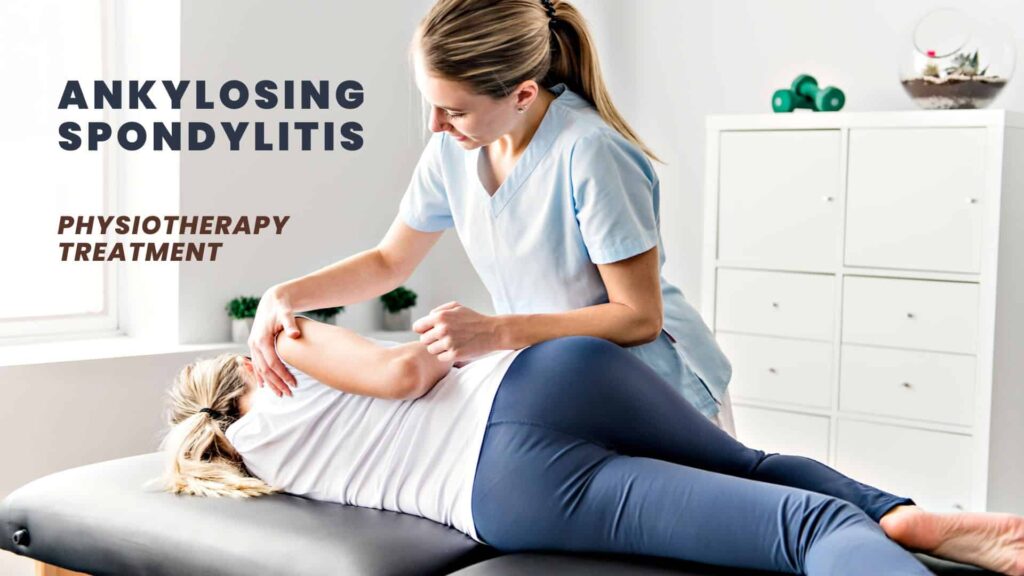Ankylosing Spondylitis
Ankylosing spondylitis (AS) is a chronic inflammatory rheumatic disorder that primarily affects the axial skeleton, including the spine and sacroiliac joints. It can cause pain, stiffness, and reduced mobility in the affected areas. The prevalence of AS varies between 0.1% and 2% in different populations, with a male-to-female ratio of around 5:1 and a peak age of onset between 20 and 35 years.
Ankylosing Spondylitis Physiotherapy Management
At Opal Physio Clinic, we understand the challenges posed by ankylosing spondylitis, a type of arthritis primarily affecting the spine. Our experienced physiotherapists specialize in providing comprehensive and personalized ankylosing spondylitis treatment programs to manage the symptoms associated with this condition effectively. We are committed to helping you regain mobility, reduce pain, and improve your overall quality of life.

What is ankylosing spondylitis?
Ankylosing spondylitis (AS) is a type of inflammatory arthritis that primarily affects the spine and sacroiliac joints (where the spine connects to the pelvis). The vertebrae and sacroiliac joints can fuse together from new bone formation, resulting in a rigid spine that causes chronic inflammation that can lead to back pain, stiffness, and loss of mobility over time.
Understanding ankylosing spondylitis
Ankylosing spondylitis is characterized by inflammation in the joints and ligaments of the spine, leading to the fusion of vertebrae over time. This fusion restricts movement and often results in severe pain and stiffness. It is a type of arthritis and belongs to a family of similar conditions called spondyloarthritis. Ankylosing spondylitis can also affect peripheral joints like the knees, ankles, and hips.
While AS commonly affects young men in their twenties and thirties, it can occur in individuals of any age or gender.
The exact cause of AS is unknown, but it is believed to be linked to a gene variant called HLA-B27.
The HLA-B27 gene variant can be inherited from a family member, and it is estimated that between 5 and 10% of children with this gene variant will develop AS.
Diagnosing AS can be challenging as the condition develops slowly, and no definitive test exists.
Diagnosis typically involves a thorough physical exam, blood tests to check for inflammation, and imaging tests such as X-rays.
Symptoms of ankylosing spondylitis
The symptoms of ankylosing spondylitis vary from person to person, and the main symptoms are:
- Persistent pain and stiffness in the lower back and hips.
- Pain is often worse at night and after periods of inactivity.
- The stiffness usually worsens in the morning but can improve as the day progresses.
Other symptoms of AS include:
- Fatigue.
- Weight loss.
- Loss of appetite.
- Fever.
- A general feeling of ill health (malaise).
- Eye inflammation (uveitis).
- Skin disease (psoriasis)
- Gut disease (inflammatory bowel disease)
In severe cases, the inflammation can cause the vertebrae (bones in the spine) to fuse (grow together), leading to a hunched posture and potentially affecting the ribs, making breathing difficult.
Treatment for ankylosing spondylitis
Ankylosing spondylitis is a chronic (long-term) condition. There is no known cure for AS, but treatment is available to help relieve symptoms, prevent or delay complications of spinal deformity and slow disease progression.
Treatment usually involves a combination of exercise, physiotherapy, and medication. Surgery may be recommended in rare cases to repair joint damage or correct spinal deformities.
Individuals with AS must work closely with their healthcare team to manage the disease effectively and maintain a good quality of life.
Physical therapy and an active lifestyle can help manage the condition, improve flexibility, and maintain fitness, strength, and proper posture.

Managing ankylosing spondylitis symptoms with physiotherapy
Managing symptoms of AS with physiotherapy is an effective approach to improving flexibility and posture and reducing pain. Regular exercise and physical therapy are essential components of AS treatment.
Exercise is an important part of physiotherapy treatment for AS. It helps maintain flexibility and range of motion in the joints and strengthens the muscles around them.
Our physiotherapists at Opal employ evidence-based techniques tailored to your specific needs. We will design an exercise program based on your symptoms, fitness level, and other factors. The program will be gradually increased as your symptoms improve. By comprehensively assessing your symptoms and condition, we develop a personalized treatment plan to address your goals effectively.
Physiotherapy treatment for AS helps relieve pain, improve mobility and function, and prevent further disease progression.
Benefits of physiotherapy for ankylosing spondylitis:
Physiotherapy offers several benefits for individuals with ankylosing spondylitis, including:
- Reduced pain: Physiotherapy can help alleviate pain associated with AS by addressing inflammation and stiffness in the joints and spine
- Improved flexibility and range of motion: Regular stretching and range-of-motion exercises can help maintain spinal flexibility and prevent stiffness, swelling, and pain
- Enhanced posture: Physiotherapy can help improve posture by teaching proper body alignment and providing exercises to strengthen the muscles that support and reduce strain on your spine.
- Increased strength: Strengthening exercises can help improve muscle function and support the joints affected by AS.
- Better cardiovascular health: Aerobic exercises, such as indoor cycling or water aerobics, can help improve cardiovascular fitness and overall health
- Minimized fatigue: Regular exercise can help reduce fatigue often experienced by individuals with AS. Fatigue can also be reduced by improving energy conservation techniques and appropriate pacing strategies.
- Personalized treatment plans: Physiotherapists can develop individualized exercise programs tailored to the specific needs and limitations of each person with AS
How can our Langley physiotherapy clinic help you with ankylosing spondylitis?
There is no one-size-fits-all for ankylosing spondylitis treatment, and the best physiotherapy treatment for AS will vary depending on the individual’s specific condition and needs.
Our physiotherapy treatments for ankylosing spondylitis include:
- Soft tissue release and mobilizations: Soft tissue massage and mobilization techniques are utilized to reduce pain, relieve muscle tension, and improve joint mobility.
- Trigger point therapy: Applying targeted pressure to specific muscle knots or trigger points alleviates pain and improves muscle function.
- Exercise programs: Tailored exercise programs that focus on stretching tight muscles, strengthening weak areas, improving posture, and enhancing overall physical fitness.
- Strengthening exercises: For enhancing core stability that supports the spine and helps to prevent further complications associated with AS.
- Postural correction: Our physiotherapists provide guidance for maintaining proper posture during daily activities to minimize stress on your spine.
- Education and self-management strategies: We empower you with knowledge about AS, educating you on lifestyle modifications, ergonomic principles, and self-care techniques.
Get started today!
We are dedicated to working with you to develop a comprehensive treatment program that addresses your unique needs for ankylosing spondylitis treatment.
We have provided quality physiotherapy treatment to patients with Ankylosing Spondylitis for many years. Our professional and skilled physiotherapists have experience treating complex conditions like ankylosing spondylitis. They are well-versed in the latest techniques and technologies to help relieve the pain and discomfort associated with this condition.
To book an appointment or learn more about our services, please call us today at 604-532-7887 and take the first step towards managing your ankylosing spondylitis effectively and reclaiming a pain-free life!
